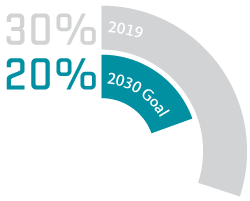A Transportation Demand Management Plan for the Corvallis Campus
The OSU 2030 Sustainable Transportation Strategy identifies a university goal to reduce the number of single-occupancy vehicle trips to OSU's Corvallis campus over the next ten years.
About the Sustainable Transportation Strategy
In 2019, an estimated 30% of the university’s Corvallis employees and students arrived on campus by driving alone. The university’s 2030 Sustainable Transportation Strategy aims to lower that percentage by one third, to 20% by the year 2030. To achieve this goal, the plan identifies 15 actions to be completed over the next 10 years. These actions respond to the diverse transportation needs of OSU students and employees and support individual flexibility and daily choice in commuting. Even occasional choices to work remotely, carpool, bike or take the bus will have powerful collective results for climate action, neighborhood relations, more affordable access to education and employment, and careful stewardship of state land and financial resources.

OSU pledges to reduce the rate of drive-alone commute trips
by a third over the next ten years, to 20% by the year 2030.
15 Actions
Actions within the Strategy fall into three categories: Commuter Programs to enhance flexible daily options such as carpooling and remote work, Transit Improvements, and Bicycle and Pedestrian Improvements. Each Action will require its own implementation process, including outreach and refinement with campus partners.
Five Key Values
The Sustainable Transportation Strategy is guided by five key OSU values. The following institutional values informed the selection of strategies and policies to reduce drive-alone trips to the Corvallis campus.
Climate Action: Be bold in addressing the climate crisis.
Good Neighborhood Relations: Help to reduce traffic and parking impacts in adjacent neighborhoods.
Equity and Affordability: Ensure affordable access to education and employment for individuals at all income levels.
Land Preservation: Preserve land for education, research and open space.
Financial Stewardship: Use financial resources wisely to maximize return on investment and support our values.
The Four Cs
The Sustainable Transportation Strategy is built on a foundational framework called the Four Cs, which recognizes that individual transportation choices are influenced by these four categories:
Cost: This includes both the total travel costs for different transportation modes as well as how individuals experience those costs.
Culture: How are transportation alternatives supported by OSU's culture, through examples and messages from supervisors, colleagues and peers.
Convenience: The degree to which alternatives to driving are comparably easy and efficient.
Concrete: The built environment that supports mobility options, including everything from on-campus facilities such as bike parking to public amenities such as transit stops.
Project Team
Nunes-Ueno Consulting
Paulo Nunes-Ueno, Principal
OSU Transportation Services
Meredith Williams, Director
Sarah Bronstein, Sustainable Transportation Manager
OSU Capital Planning and Development
Bob Richardson, Planning Manager